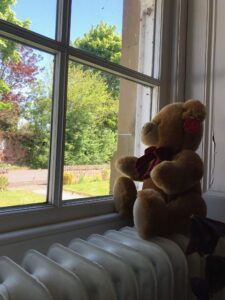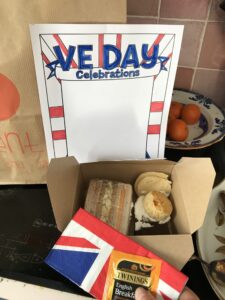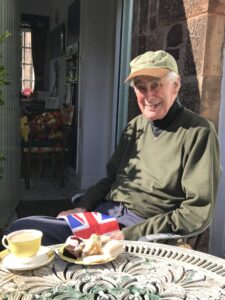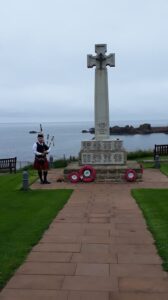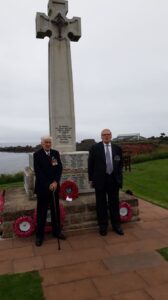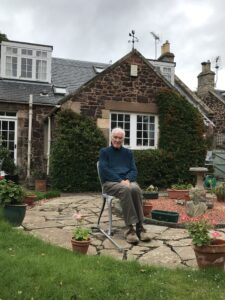Dunbar in Lockdown– a personal perspective reflecting on the effect of Covid-19 on Dunbar.
To find a precedent for the current lockdown, one should go back to the winter of 1337/8 when Dunbar was besieged by the Earls of Salisbury and Arundel and defended by Agnes Countess of Dunbar. She defied them through a long siege and they finally gave up and went away. One can only imagine what life must have been like for the townspeople during that long winter, although, presumably many of them had fled the scene.
2020 started normally enough – people emerged from the New Year holiday and started their winter programmes as usual. People went back to work. The children went back to school and the senior pupils began to focus on serious work for exam schedules. Societies like Probus began their winter programmes The Community Council began to plan to celebrate the 650th anniversary of King David II’s charter. We flew the town banner on the anniversary, the 8th February and intended to celebrate the anniversary in Civic Week.
By then we were beginning to hear rumours of problems of health scares in the Far East and were wondering what implications there might be. The idea of a Covid 19 pandemic was confirmed on the 1st March and we began to consider what we should be doing in the circumstances which might arise. We decided to postpone the East Lothian Antiquarian Annual Dinner. The Probus Club meetings were suspended, and other groups took similar measures.
The Scottish Government imposed a lockdown on 23rd March. Restrictions were placed on individuals leaving homes. The elderly and vulnerable were particularly restricted. Visitors were not permitted. Gatherings were not to be more than two. Social distancing was to be observed with a two-metre distance kept. Visitors were only allowed outside. Shopping was allowed for basic necessities, so non-essential shops were to close, and some are still closed. Libraries, schools and parks were closed. Places of worship were closed. Weddings and Christenings were stopped. Funerals were to be limited to immediate families. Hospital and nursing home visiting was stopped. Medical services were limited and where possible to be done by telephone. Exercise was to be limited and taken alone. Travel was only to be done for essential work. Social events were not to happen. All this was to have immediate effect and would be backed up with legal powers. The powers would be reviewed by the Scottish and Westminster governments and modified in the light of events. They would be reviewed after three weeks. In fact, they have been reviewed regularly, in some ways relaxed and in others extended as the fear or the pandemic has continued. Press Comments now suggest it may last for two years.
The restrictions-imposed conditions on our lives like no other period in history. They have in many ways been worse than conditions in wartime.
It was probably worse for families than others. The town shut down and became a ghost town. Work stopped. Offices and work places closed. Work dried up or had to be done from home. Families were confined to homes. Children were no longer at school or with child minders. Parents had to try to home–school or child mind while trying to do some work. Some children were able to attend an educational hub if their parents were defined as key workers or if the children had special needs. Money for many people dried up or became uncertain. Some people continued to be paid in full, or in part, and some were furloughed. Pensions continued to be paid and were actually increased slightly. This disruption still continues and so offices and workplaces, still, well into August, have not re–opened. Council offices are manned with a skeleton staff and most staff are working from home. Schools have made a shaky start after a nightmare scenario over exam results. Some, in other parts of Scotland, only a few days into the new term, have already re-closed faced with a recurrence of the virus.
Those of us who were elderly or had an underlying health condition were asked to shield ourselves and isolate, seeing no one in the house and only single visitors and two metres away outside. This proved bleak for those who live alone. Contact was maintained by telephone, and then by a new phenomenon – Zoom conferencing! I had my home help come to garden but not for housework. and my daughter and son–in– law came to the door with shopping. I have gradually relaxed this, however, I still have very little contact with people. Though house visits ceased many neighbours and others made offers of help if required and some contacts were maintained by telephone. My sister and I established a three-way link with my cousin in Canada and I joined face book and established some contact with many relatives I had previously little or no contact with.
Gradually the town came to grips with the situation. The community council along with George Robertson and Pippa Swan set up an emergency committee and it gathered a group of volunteers who did what they could to help people in need. The local Foodbank also handed out food to the needy. The new committee established a food service bringing meals to the housebound. This started in April and went on till 31st July making daily provision and since then have provided a meal on Fridays. This proved a great blessing and, on some days, an only contact with the outside world. This was particularly appreciated on VE Day. Because of the Lock Down the day, though remembered, could not be celebrated in the normal way. The emergency committee arranged for a festive tea to be brought to the house– bound and with it came a poster done by the children in the school hub. When VJ Day came on the 15th August, the Community Council decided to come out of Lockdown and, with representatives of the Royal British Legion, held a small Commemoration at the War Memorial.
The community realised that we had to find a virtual way to work and established Zoom meetings for The Community Council, the Area Partnership and other meetings. The churches took similar initiatives. St Anne’s established a zoom service where post service conversation could take place. People found this valuable.
As we were not going to be able to celebrate the anniversary of the Burgh charter Ian Hamilton suggested that I should write some local history for the benefit of newcomers to Dunbar. It seemed to me that if I was to do, so the best idea would be to produce an account filling in the period since the previous anniversary which would be of value to those who had grown up in the meantime as well as to newcomers. This I have tried to do but it was made difficult in a world of closed libraries. I am grateful for help I got from various people despite lockdown. I have therefore produced this series of papers in which I have outlined the changes that have come about in Dunbar from the demise of the historic burgh and in subsequent periods of local government.
The last six months has been a strange time. We have all lost friends during these difficult times. We have had to grieve in silence for friends who have died and whose passing we have felt unable to mourn properly. We have remembered the end of the war and those we lost in that conflict and those who have died since. We have shared in the sorrow of the bereaved and in Dunbar have recognised on the war memorial more of those who lost their lives in both wars.
We were inspired by Dame Vera Lynn, by the Queen and by Capt. Sir Tom Morris but, as the grey summer passes,’ Some Sunny day’ seems far off. We need to go back to King George VI’s Christmas message in 1939 to sustain us for this long haul. He quoted the poem ‘I said to the man who stood at the gate of the year, give me a light that I may tread safely into the unknown and he replied. Go out into the darkness and put thy hand into the hand of God. That shall be to thee better than light and safer than a known way. [M Louise Hoskins].
The siege of Dunbar lasted from 13th Jan to 10th June, 1338. The war lasted from 1939 until 1945. Our ordeal too will come to an end. DV.
Stephen Bunyan 29 08 20
